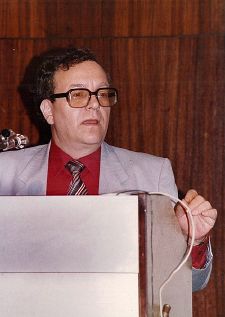Alexander Shtromas
| Alexander Shtromas | |
 Alexandras Shtromas speaking on the Fall of the Soviet System, Geneva, Switzerland, August 1985
| |
| Born | April 04 1931 Kaunas, Lithuania |
|---|---|
| Died | June 12 1999 (aged 68) Chicago, Illinois, U.S. |
| Nationality | Lithuanian |
| Fields | Political Science |
| Institutions | Bradford University
Salford University Hillsdale College |
| Alma mater | Vilnius University Moscow State University |
| Known for | Human rights activism with participation in dissident movement in the Soviet Union |
Alexander Shtromas (Lithuanian: Aleksandras Štromas; 4 April 1931 in Kaunas, Lithuania – 12 June 1999 in Chicago) was a prominent Lithuanian political scientist, dissident, professor and author.
Life
Alexander Shtromas was born in Kaunas, Lithuania. His father, Jurgis Shtromas, served as a diplomat in Berlin and then as an official in Kaunas. His mother, Eugenija Kozin, was a Russian-speaking Jew. His father was killed by the Nazis shortly after the German invasion.
During the Nazi occupation of Lithuania Alexander, along with his mother and sister, was imprisoned in the Kovno Ghetto, later concentration camp, in Vilijampolė. Alexander and his sister were rescued from the ghetto by Antanas and Marija Macenavicius, a Catholic family who hid them outside the city.[1] However, Alexander would go back into the city to see his mother in the ghetto until she committed suicied.[2]
After the Russians reoccupied Lithuania, Shtromas was found by Antanas Sniečkus, a Soviet general who had known his father, and who took him in and raised him as his adopted son. Sniečkus became the First Secretary of the Communist Party of Lithuania, and Alexander became a faithful believer in Communism.
With the support of Sniečkus, he began his studies at Vilnius University, and then finished at Moscow State University where he was a classmate of Mikhail Gorbachev. Shtromas graduated with a degree in law in 1964. Soon afterward he became a critic of the Soviet regime and was forced to leave the country.
His sister was married to a successful British businessman and living in England, so he moved to the United Kingdom.
Aleksandras Shtromas died of lung cancer on June 12, 1999 aged 68.
Career
There, he was appointed to a position in the Department of Peace Studies at the University of Bradford by Adam Curle.[3] He later served as Lecturer in Politicas at Salford University,[4] and, until his death, as Professor of Politics at Hillsdale College in the United States.[2]
Legacy
A book with tributes by fellow dissidents, academic colleagues and former students (mainly in English but also in Lithuanian and Russian) was published in 2008 in Lithuania, edited by Leonidas Donskis (XX A. Zmogus: Aleksandro Stromo Portretai).
Major works in English
- Who are the Soviet Dissidents?. 1979.
- Political Change and Social Development: The Case of the Soviet Union. 1981.
- To Fight Communism: Why and how?. 1985.
- The Soviet Method of Conquest of the Baltic States: Lessons for the West. 1986.
- The Soviet Union and the Challenge of the Future with Morton A. Kaplan (eds.). 1988.
- The End of "Isms"?: Reflections on the fate of ideological politics after Communism's collapse (ed.). 1994.
- Totalitarianism and the Prospects for World Order: Closing the Door on the Twentieth Century. 2003.
- Dissent and political change in the Soviet Union Studies in Comparative Communism 12(2/3) (Summer/Autumn 1979): 212-244. Retrieved February 17, 2022.
- Dissent, Nationalism and the Soviet Future Studies in Comparative Communism 20(3/4) (Autumn/Winter 1987): 277-286. Retrieved February 17, 2022.
Notes
- ↑ Leonidas Donskis, A Baltic woman ahead of her time, The Baltic Times, March 23, 2016. Retrieved February 17, 2022.
- ↑ 2.0 2.1 Morgan Delp, Remembering Aleksandras Shtromas The Collegian, December 4, 2014. Retrieved February 17, 2022.
- ↑ Robert A. McKinlay, "From Harvard to Bradford" in Tom Woodhouse (ed.), Peacemaking in a Troubled World (Berg Pub Ltd, 1991, ISBN 978-0854965946).
- ↑ Romuald J. Misiunas, Book Review Political Change and Social Development: The Case of the Soviet Union by Alexander Shtromas; Politinė Samonė Lietuvoje (Political Consciousness in Lithuania) by Aleksandras Stromas Political Psychology 4(1) (Mar., 1983): 157-165. Retrieved February 17, 2022.
ReferencesISBN links support NWE through referral fees
- Donskis, Leonidas. Identity and Freedom. Routledge, 2015. ISBN 978-1138874411
- Woodhouse, Tom. Peacemaking in a Troubled World. Berg Pub Ltd, 1991. ISBN 978-0854965946
External links
- Remembering Aleksandras Shtromas Morgan Delp, The Collegian, December 4, 2014.
- Some Memories of Alex Shtromas Gordon Anderson, Professors World Peace Academy, December 18, 2002.
- A Baltic woman ahead of her time by Leonidas Donskis, The Baltic Times, March 23, 2016.
Credits
New World Encyclopedia writers and editors rewrote and completed the Wikipedia article in accordance with New World Encyclopedia standards. This article abides by terms of the Creative Commons CC-by-sa 3.0 License (CC-by-sa), which may be used and disseminated with proper attribution. Credit is due under the terms of this license that can reference both the New World Encyclopedia contributors and the selfless volunteer contributors of the Wikimedia Foundation. To cite this article click here for a list of acceptable citing formats.The history of earlier contributions by wikipedians is accessible to researchers here:
The history of this article since it was imported to New World Encyclopedia:
Note: Some restrictions may apply to use of individual images which are separately licensed.